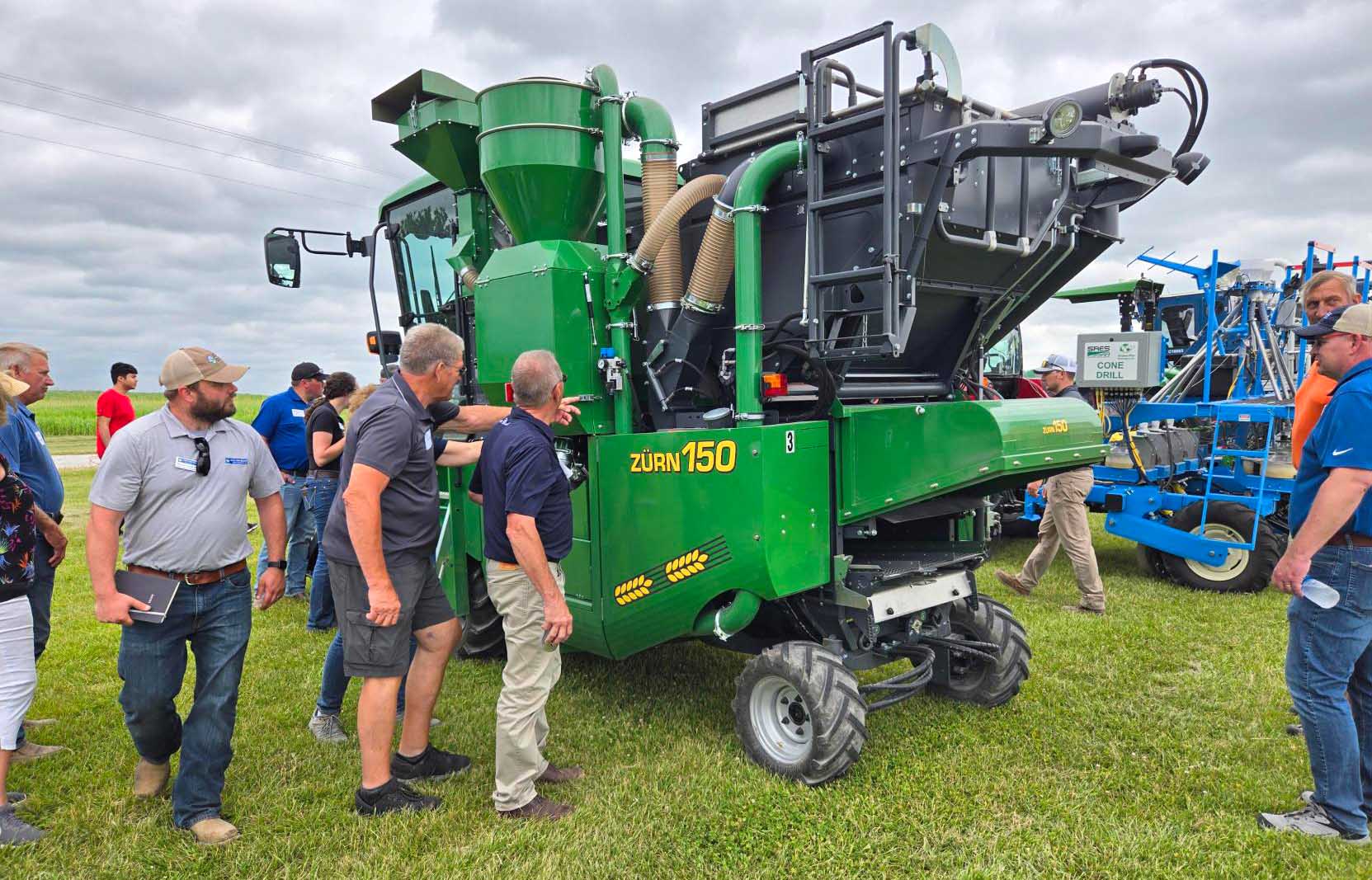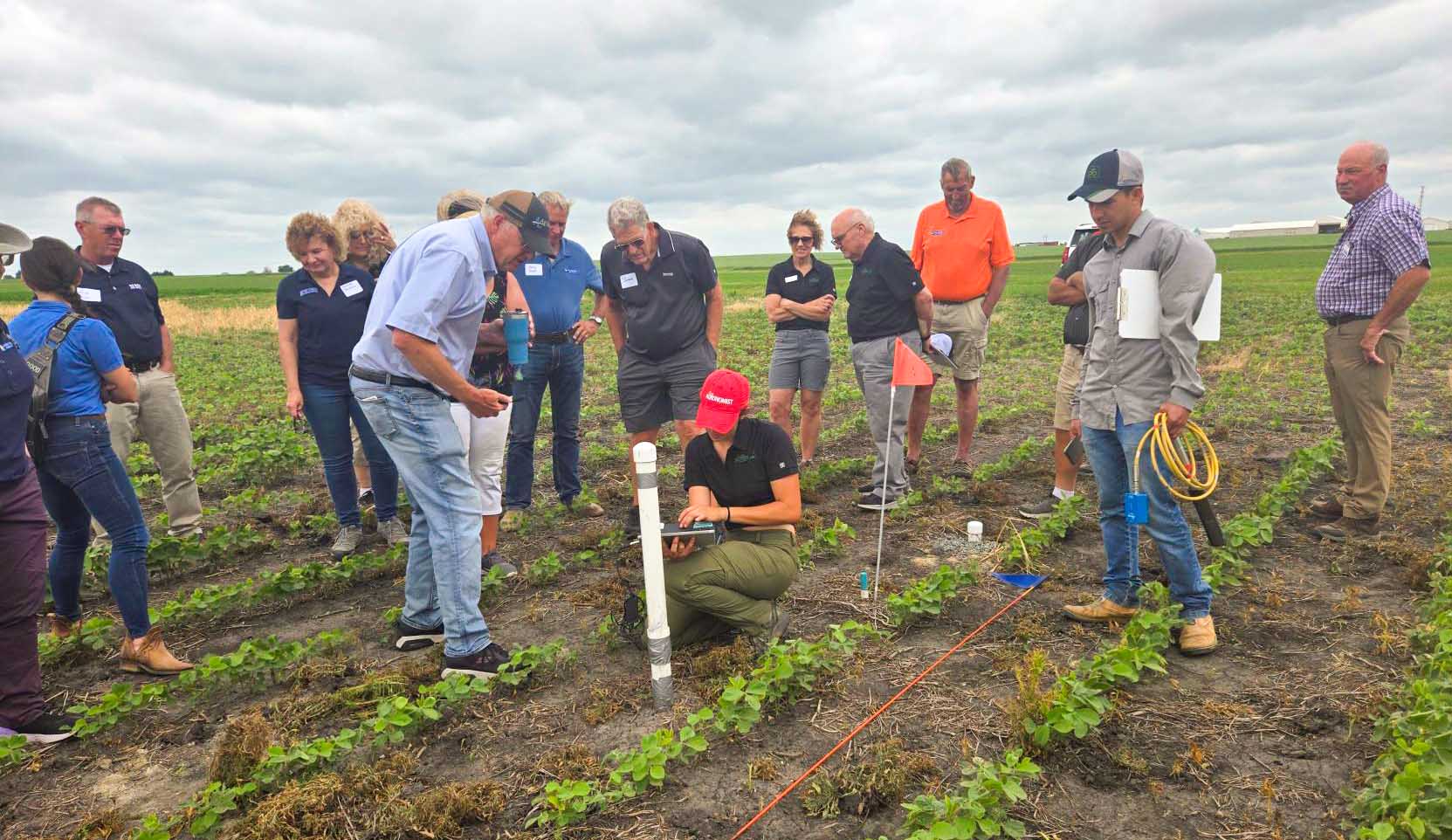
(Photo: Iowa Soybean Association / Kriss Nelson)
A look into the future of agriculture
June 27, 2024 | Kriss Nelson
The board of directors for the Iowa Soybean Association (ISA) and Soy Leader’s Network took a first-hand look at the research conducted by the Iowa Soybean Research Center and AI Institute for Resilient Agriculture (AIIRA). ISA strongly supports both projects.
The tour included a stop at the continuous soybean research plot at Iowa State University’s (ISU) Agricultural Engineering and Agronomy Farm and classroom and plot visits at the Field Extension and Education Laboratory learning more about the AIIRA project.
“The research that is done and the developments from that research have the end users in mind – our farmers,” says Matthew Carroll, ISA analytics and insights lead. “Field days like this showcase and provide updates on research and allow farmers to provide feedback.”

Continuous soybean research
The continuous soybean experiment began in May 2023. Research is now in its second year of data collection, but third year of continuous soybeans. Trials are being conducted at the Agricultural Engineering and Agronomy Farm near Boone and at the Northwest Research Farm in Sutherland.
Marty Danzer, ISA District 4 farmer-director from Carroll says he is interested in learning more about the long-term results from the continuous soybean trials.
“I am very apprehensive about that practice; I am unsure if it would work on my farm,” he says.
Carolina Freitas, a graduate student at ISU says this is a long-term project is expected to last 10 years.
“The continuous soybean study results from an increase in soy demand, building crushing capacity, sustainable aviation fuel and volatility of prices,” says Freitas.
Besides continuous soybean research, hydrology data is being obtained from sensors which will provide information on the importance of water tables to crop production.
AIIRA
Artificial Intelligence (A.I.) is increasingly being integrated into agriculture. To help bring this technology to farmers, the AIIRA project was developed.
“At AIIRA we are working to design the next generation of A.I. technologies and tools that are practical and profitable for growers,” says Baskar Ganapathysubramanian, director of A.I. Institute/lead investigator and the Joseph C. and Elizabeth A. Anderlik Professor in Engineering at ISU.
Funded by the National Science Foundation (NSF) and the USDA’s National Institute of Food and Agriculture, ISA is a key partner of AIIRA helping to recruit farmers for their work conducting various projects, including developing a weed identification app using A.I. Carroll says this project is nearly ready for use by farmers.
“We received a lot of feedback from farmers during the field day and that is a big value and what we are looking for,” says Carroll. “We want to make sure the product that gets developed is as useful as possible.”
Arti Singh, associate professor in the ISA agronomy department says the goal is to have the app identify weeds at early growth stages between 4 to 6-inches.
“Crop yield losses are minimized when weeds are controlled at an early stage,” says Singh. “The app will be a precise, multi-stress detection and quantification in real-time using smartphones, unmanned aerial vehicles (UAVs) and robots. I am very excited to work with farmers to give us the right direction and questions to answer.”
COALESCE
Soumik Sarkar, ISU associate professor of mechanical engineering presented to the group his work with Context-Aware Learning for Sustainable CybEr-agricultural (COALESE) systems.
ISA’s role is helping the research team identify technical problems and disseminate the research outcome knowledge among farmers.
The COALESCE project seeks to transform Cyber-Physical Systems (CPS) capabilities in agriculture by developing a novel, context-aware cyber-agricultural system that encompasses sensing, modeling and actuation to enable farmers to respond to crop stressors with lower cost, greater agility and significantly lower environmental impact than current practices.
“Our goal is to disrupt current agricultural practices with CPS innovations to enhance efficiency, resiliency, sustainability and autonomy,” says Sarkar.
Examples of this are to design a scale-agnostic, cyber-agricultural system that provides individual plant management.
Drone spraying
One example of research being done with COALESCE is drone spraying.
Sam Blair, a graduate student at ISU, is working on a project that will use the weed ID app on a drone to classify what weeds are in the field and where to create a map to feed into the sprayer drone, sending it to spot spray a field versus having to broadcast spray the entire area.
For Danzer, this research is defining the future of agriculture.
“We are leveraging checkoff dollars for these research projects that will hopefully promote and enhance Iowa’s soybean industry,” says Danzer. “To me, these are dollars well spent. Agriculture is ever-changing, and research will have an effect on our return on investment.”
For more information contact Carroll at mcarroll@iasoybeans.com or call 515-334-1071.
Back